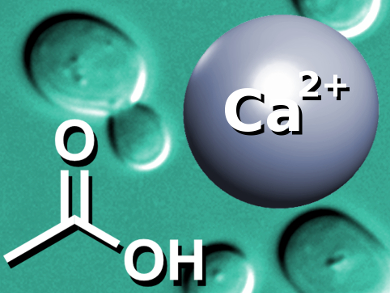Lignocellulosic biomass is a potential substrate for fermentational ethanol production. For an economically reasonable production, all sugars present in the biomass must be utilized. Since Saccharomyces cerevisiae does not use all sugars present naturally, a pretreatment of the lignocellulosic biomass is necessary in order to convert the respective sugars. However, this pretreatment of lignocellulosic materials also produces inhibitory compounds, such as acetic acid, which impair the subsequent ethanol production by S. cerevisiae.
Akihiko Kondo, Kobe University, Japan, and colleagues investigated the effect of supplementation with metal ions (Zn2+, Mg2+, and Ca2+) on the ethanol production by S. cerevisiae. The ethanol production was increased in the presence of metal ions linked to a higher cell viability. Comparison of the gene expression levels shows that the improved tolerance towards acetic acid is most likely due to the induction of genes that control the cell wall and membrane.
The simple addition of metal ions in real biomass hydrolysates may, therefore, increase the cell viability under acetic acid stress resulting in higher overall ethanol production from lignocellulosic biomass.
- Zinc, magnesium, and calcium ion supplementation confers tolerance to acetic acid stress in industrial Saccharomyces cerevisiae utilizing xylose,
Ku Syahidah Ku Ismail, Takatoshi Sakamoto, Tomohisa Hasunuma, Xin-Qing Zhao, Akihiko Kondo,
Biotechnol. J. 2014.
DOI: 10.1002/biot.201300553




